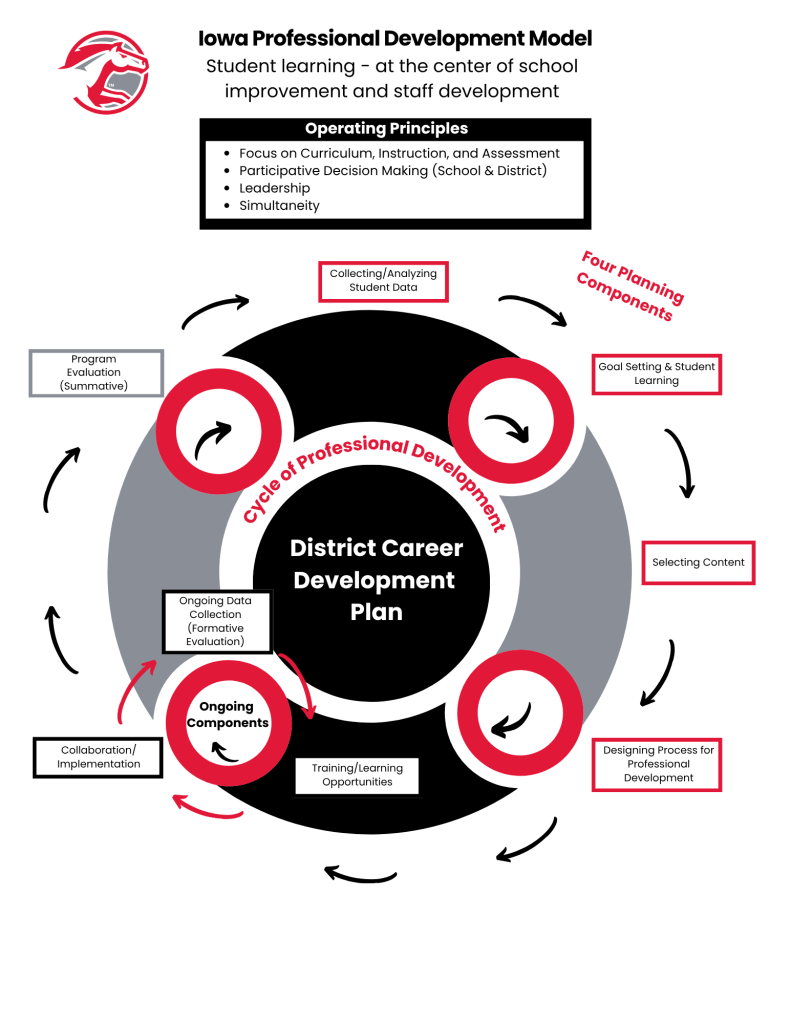Teaching & Learning
The Dallas Center-Grimes Community School District Teaching and Learning Department puts in a great deal of work behind-the-scenes to continuously improve our district’s programming.
District Curriculum
The Iowa Department of Education has constructed the Iowa Academic Standards for all Iowa schools. These standards establish what all students are expected to know and be able to do throughout their K-12 education. You can access all of the Iowa Academic Standards at the Department of Education’s website: https://educate.iowa.gov/pk-12/standards/academics
Our district emphasizes a Guaranteed and Viable curriculum for all students by working with our highly qualified educators to ensure each classroom has access to quality instructional practices and materials. Additionally, we engage teachers in a thorough curriculum review cycle, structured on a seven-year rotation to examine standards, consider best practices, and evaluate instructional materials.
Course Resources
Through our curriculum review cycle, teachers engage in a thorough examination of content area standards, best practices in instruction, and evaluate current and potential instructional resources. Click here to find the resources currently in use in our classrooms for English Language Arts and Math.
Professional Development
The Dallas Center-Grimes Focus for Professional Development:
To increase achievement for all students through a focus on social-emotional well being and a guaranteed and viable curriculum that includes engagement, infusion of technology, and research-based practices.
At Dallas Center-Grimes, we provide professional learning experiences for our educators. The district ensures that the professional development aligns with the requirements of Iowa Professional Development Model. Professional development is an integral part of school improvement and helps ensure every classroom contains a highly qualified teacher who will positively impact student learning and performance. Improved student learning is, and always will be, a primary focus at Dallas Center-Grimes Community School District. Targeted professional learning is provided throughout the year on designated professional development days and job-embedded professional development experiences are possible as a result of our district Teacher Leadership and Compensation (TLC) Program.

Title I and Intervention
Each school in our district has interventionists who provide support to students who have demonstrated an academic need. At this time, our K-8 buildings have literacy interventionists who focus on reading and writing skills, while our 9-12 high school has academic interventionists to support students across all content areas.
Our K-8 Literacy Intervention program, including Title I, provides students with supplemental literacy instruction focused on complimenting and enhancing the instruction received in their grade level classroom. Intervention services are designed to meet students where they are at, build upon their strengths, and work to close any gaps in the area of literacy. Instruction provided by our literacy interventionists is targeted for each student, focusing on the five components of literacy: phonemic awareness, phonics, fluency, vocabulary, and comprehension.
Title I is a federally-funded, assistance program for schools who qualify based on percentages of low income households in their attendance area. At DCG, we are part of a targeted assistance model, so schools in receipt of these funds must design and implement our program by using data to determine students who demonstrate an academic need in the area of literacy. Title funds must be used to provide supplemental services which are limited to eligible students.
Title I is designed to provide all students equitable opportunities for quality education that help close achievement gaps. Funding is available for schools with high percentages of students from low income households. These federal funds are allocated through formulas based on census poverty data estimated along with the cost of education in each state. –Title I, Part A (Title I) of the Elementary and Secondary Education Act (ESEA), as amended by the Every Student Succeeds Act (ESSA)
Title I Parents/Guardians Right-to-Know
- Parents/guardians have the right to information on the professional qualifications of their child’s classroom teacher from the school district. The federal education law put in place by the Elementary & Secondary Education Act (ESEA) requires that all parents in a Title I school be notified and given the opportunity to request information about the professional qualifications of classroom teachers instructing their child. In addition, a Title I school must provide each parent of a child who is a student in such school with information on the student’s level of achievement and academic growth on each Title I state academic assessment (if applicable and available) and timely notice that the student has been assigned (or has been taught for four or more consecutive weeks by) a teacher who does not meet applicable state certification or licensure requirements at the grade level and subject area in which the teacher has been assigned.
Title I Parent/Family Engagement Policy Summary
- It is the policy of the Dallas Center–Grimes Schools that parents of participating children shall have the opportunity to be involved jointly in the district’s review process for the purpose of school improvement. Recognizing that parental involvement is the key to academic achievement, we seek to involve parents in an effective home-school partnership that will provide the best possible education for our students. The district encourages parent involvement and supports this partnership through providing information about standards and assessments; providing training and materials for parents to help their children; educating school personnel about involving parents and the value of parent contribution; and developing roles for community organizations and businesses to work with parents and schools. Below are steps that our Title program engages in each year:
- 1) Each Title I school will develop and coordinate a parent advisory group that can provide meaningful feedback for the Title I program.
- 2) The Parent and Family Engagement Policy will be distributed to the parents of identified Title I students every year during our annual parent meetings.
- 3) Each year, DCG teachers and administrators will gain input from Title I parents and students so that the Parent and Family Involvement Policy is collaboratively developed and revised.
- 4) To keep our families informed of the Title I program, each Title school will hold at least one annual literacy meeting, along with parent/teacher conferences, to provide:
- 1) Technical assistance
- 2) Describe how the Title I program supports the students
- 3) Explain the curriculum/state standards and its uses in the school
- 4) The forms of academic assessments used to measure growth and progress
- 5) Explain the proficiency levels students are expected to meet
- 6) Provide opportunities for parent input on the program
- 7) And provide information on how parents can support the literacy development of their children at home.
- 5) As DCG works with Title I students, teachers and administrators will work with other federally, state, and locally funded programs so that we are using funds wisely, effectively, and efficiently. These programs include preschool, local library programs, and special education programs. Our homeless education program coordinates with the local backpack program to offer students support that are food insecure, especially over the weekends.
- 6) DCG conducts annual evaluations of the content and effectiveness of the Parent and Family Engagement Policy.
- 7) DCG uses the findings from the annual evaluation to design evidence-based strategies for more effective parent and family engagement.
- 8) A jointly developed school/parent compact outlines how parents and family members, the entire school staff, and students all share responsibility for improved student achievement. The compact also describes the means by which the school and parents will build and develop a partnership to help children achieve our local high standards. It is distributed to parents of Title I students and is reviewed at the annual meetings.
- 9) The policy will be provided in English and Spanish and will be free of educational jargon. If a parent has a question regarding any terminology, please request additional information from the Title I teacher or coordinator.
- Providing all students of Dallas Center–Grimes Community School District with equal access to quality education is of primary purpose. It is crucial that all partners (students, parents, educators, and communities) have the opportunity to provide input and offer resources to meet this purpose. As these partnerships are mutually beneficial, developing cooperative efforts will ensure improved academic achievement for all students. To review the Parent/Family Engagement Policy in its entirety, please click HERE.
How students qualify for Title services
- Any student at designated buildings, with priority for first and second-grade students at the elementary level. We believe early intervention leads to increased success in school.
- The opportunity to be part of a Title I program is determined for each child based on information from many tools used by the Title I Reading teacher. Included are report cards, state reading screenings, and a child’s performance on several district measurements of reading. Classroom teacher and parent recommendations are important to Title I placement.
- Each student entering the Title I program is screened to determine at what level he or she is reading. Students are monitored closely for progress throughout the school year.
Teacher Leadership Grant
The Teacher Leadership and Compensation (TLC) system rewards effective teachers with leadership opportunities and higher pay, attracts promising new teachers with competitive starting salaries and more support, and fosters greater collaboration for all teachers to learn from each other.
The overriding philosophy of the system is multi-pronged, but boils down to this: Improving student learning requires improving the instruction they receive each day. There is no better way to do this than to empower our best teachers to lead the effort.
Through the system, teacher leaders take on extra responsibilities, including helping colleagues analyze data and fine tune instructional strategies as well as coaching and co-teaching.
The goals of the Teacher Leadership and Compensation System are:
- Attract able and promising new teachers by offering competitive starting salaries and offering short-term and long-term professional development and leadership opportunities.
- Retain effective teachers by providing enhanced career opportunities.
- Promote collaboration by developing and supporting opportunities for teachers in schools and school districts statewide to learn from each other.
- Reward professional growth and effective teaching by providing pathways for career opportunities that come with increased leadership responsibilities and involve increased compensation.
- Improve student achievement by strengthening instruction.
Teacher Leadership Positions in the Dallas Center-Grimes Community School District include:
Mentor Teachers (Building Level) – varies by year
Curriculum and Program Facilitators (District Level) – 5 Positions
Instructional Coaches (Building Level) – 8 Positions
PLC Leaders (Building Level) – 39 Positions
Committees & Groups
The Board of Directors of each public school district and the authorities in charge of the district shall do the following:
- Appoint a School Improvement Advisory Committee, made up of a variety of stakeholders to the district, to make recommendations to the School Board.
- Utilize recommendations from the School Improvement Advisory Committee to determine the following…
- Major educational goals
- Student learning goals
- Long-range and annual improvement goals (reading, math, and science)
- Desired level of student performance
- Progress in meeting goals related to items 2-4
- Harassment or bullying prevention goals, training and other initiatives
- Consider recommendations to infuse character education into the educational program
The District Leadership Team is made up of administrators and certified teachers from each of our seven buildings. The purpose of this team is to provide key feedback and support to the ongoing work of the Dallas Center-Grimes Community School District. The members of this team are involved in the leadership and direction setting of our district. Members typically serve a three year term if they are able.This is important as it provides the team with consistent leadership over time that will help to ensure we are working in the right direction in order to benefit the students of our district.



